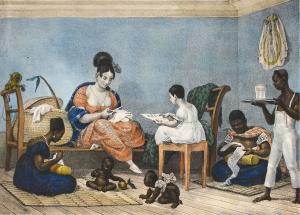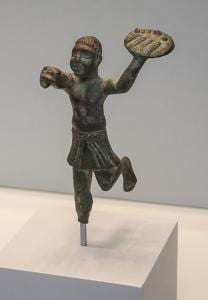 As the Markan Jesus becomes increasingly dark with predictions about the coming catastrophe, the disciples grow increasingly dense in their inability to grasp what their leader must face. In reality, the disciples are likely obtuse precisely because they do not wish to understand what his brooding comments may mean; if even a glimmer of insight breaks into their brains, they do not desire to participate at all in what Jesus will undergo. They, like us, wish to bask in the reflected glory of Jesus’s demonstrations of power and teaching brilliance, but will gladly avoid those threatening comments about suffering and death. We have always been much more enamored with Easter light than with Good Friday darkness.
As the Markan Jesus becomes increasingly dark with predictions about the coming catastrophe, the disciples grow increasingly dense in their inability to grasp what their leader must face. In reality, the disciples are likely obtuse precisely because they do not wish to understand what his brooding comments may mean; if even a glimmer of insight breaks into their brains, they do not desire to participate at all in what Jesus will undergo. They, like us, wish to bask in the reflected glory of Jesus’s demonstrations of power and teaching brilliance, but will gladly avoid those threatening comments about suffering and death. We have always been much more enamored with Easter light than with Good Friday darkness.
In today’s text, as Jesus and his followers are now firmly moving toward Jerusalem and his destiny, he offers to them the third and final passion prediction. This one is by far the fullest and most alarming of the three that he has spoken to them (see 8:31 and 9:31 for the first two). Here he is explicit, offering details that will be played out later in the story (see 14:64-65; 15:15, 19-20, 31). While the disciples were “apprehensive,” and the other followers were “frightened,” Jesus hardly allays their terrors, but adds to them with a grim recital of what is about to happen to him: “Listen, we’re going up to Jerusalem, and the human one (Son of Man) will be turned over to the ranking (chief) priests and scholars, and they will sentence him to death, and turn him over to foreigners, and they will make fun of him, and spit on him, and flog him, and put (him) to death. Yet after three days he will rise” (Mark 10:33-34)! This brings silence from the assembled followers; they have no response to make at all.
Instead, the dunderheads James and John ask what can only be seen in this context as a ludicrous, if not completely repulsive question: “Teacher, we want you to do for us whatever we ask” (Mark 10:35)! Such arrogance and narcissism as they display in this demand would be ridiculous at any time, but to ask such a thing now, in the face of Jesus’s impending doom, is little less than disgusting. Jesus’s response may be delivered with no little weariness and exasperation, coupled with a large portion of wariness; what can these ignorant children want from me now? What they want from him, however, perhaps even Jesus could not have anticipated! “In your glory, let one of us sit at your right hand, and the other at your left” (Mark 10:37). Surely, the most absurd request ever made is locked into that order! Really, Jesus, squeak James and John, we want nothing more than eternal power with you, ruling over all others when you “rise again” in glory. This demand is made, we remember, after Jesus has warned them again and again that “the last are first, the least greatest,” and the model of receiving the rule of God may be found best in a young child. These disciples remain so ignorant, so completely foolish about what Jesus has been saying and what he has come to do, that we the readers can only marvel at just how monstrous, how clueless, this request is.
Jesus replies to the demand not with a sharp rebuke, as it so richly deserves, but rather with another attempt to explain to them what it is their request actually implies. “You have no idea what you are asking for! Can you drink the cup I am drinking, or experience the baptism I am undergoing” (Mark 10:38)? Their traditional reply is, “Lord, we are able,” whence comes that ubiquitous hymn, “Lord, We are Able,” written by Earl Marlatt in 1926, whose positive announcement of ability and willingness to be Jesus’s disciple is unfortunately based on this very text that demonstrates exactly the opposite, as Jesus makes all too clear. Oh, says Jesus, you will surely drink the cup I drink, and will be baptized as I am being baptized, but as for that glory bit, “that is not mine to grant” (Mark 10:40). The cup image that Jesus employs was often used by the prophets of the Hebrew Bible for those who are facing destruction (see Ezekiel 23:33 and Isaiah 51:17 for two examples). The implication of Jesus’s retort is that what the disciples imagine to be glory at the right and left hand of power is not at all what true disciples will experience. To follow Jesus is not to experience a world of power and glory but a world of rejection, pain, and suffering at the hands of a world that defines glory in vastly different ways than Jesus has in mind.
And to make matters worse, James and John’s absurd demand for glory with Jesus sets off the jealousy bells in the other disciples, who “got annoyed with James and John” (Mark 10:41). So, once again Jesus takes the opportunity to teach the squabbling dolts about the true meaning of glory, the real understanding of greatness. “With you (unlike the gentile foreigners), whoever wants to become great must be your servant, and whoever among you wants to be ‘number one’ must be everybody’s slave. After all, the human one did not come to be served, but to serve, even to give his life as a ransom for many” (Mark 10:43-45).
It is important to hear this language of slavery and masters in its first-century context. Slaves were persons owned as property by others who have absolute authority over the slave in all things. Slaves became such through capture during war, indebtedness, punishment for crime, or merely as offspring of slave women. Perhaps 1/3 of the total population in certain areas of the Roman Empire was made up of slaves. Slaves thus were ubiquitous and a common sight during the first century CE. Slaves had only one master, the owner, thus “to be slave of everyone” should be seen as the ultimate statement of powerlessness. Instead of the expected glory, demanded by James and John, Jesus provides for his followers the portrait of absolute slavery as the gift they may expect to receive. It is an astonishing picture, a picture that has echoed down the years as one only a few have taken on as indicative of the true Christian.
If the disciples are at all redeemable as followers, they need to watch carefully the next story that Mark relates. The journey to Jerusalem takes the Jesus band to Jericho, and there they encounter a blind beggar named Bartimaeus. Rather than shouting after Jesus for some demanded glory, he shouts loudly only for mercy (Mark 10:48). Though these same ridiculous and arrogant disciples yell at him to shut up, he shouts all the louder for mercy. When he finds his way to Jesus, Jesus asks him the very same question he asked those demanding disciples: “What do you want me to do for you” (Mark 10:36, 51)? He only wants to see again, and so Jesus, after commending his trust, his faith, witnesses Bartimaeus’s renewed vision, the result of which leads to his immediate following of Jesus. Would that the so-called disciples might ask out of trust for renewed vision, a clarified sight; perhaps they, like the newest disciple Bartimaeus, could at last become true followers of Jesus. And so might it be for us. Rather than ask Jesus for some grand power, some imagined glory, some superior status, Mark infers that we need to be asking for clearer vision to enable us to see what it is that Jesus actually wants of us, namely to become servants and slaves and thereby transform the world and its lust for power. Though Jesus will say to someone who requests healing from him “you are not far from the rule of God, “ I fear I am far from that rule, since I still would far rather have glory than to demean myself as slave or servant or little child. How about you?
(Images from Wikimedia Commons)











